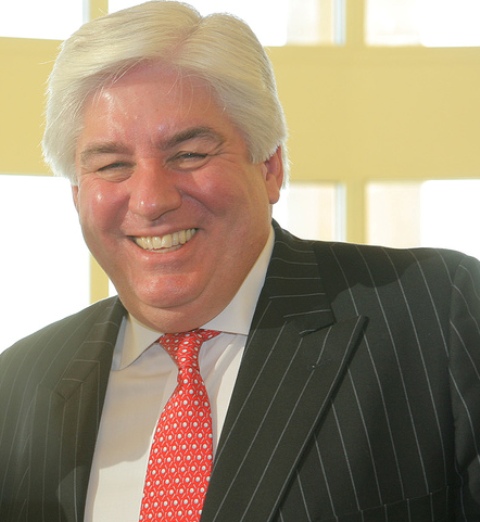Unapolgetic Titans of Finance
Former CEOs insist at congressional hearings that larger market forces, rather than decisions made by executives, caused Wall Street to unravel.
Jul 31, 202091.8K Shares2.1M Views
AIG Tower, Hong Kong (flickr: Marc Oh!)
Three weeks after the Federal Reserve threw an $85-billion lifeline to the American International Group, the Fed gave another loan Wednesday to the world’s biggest insurer. This extra money could total $37.8 billion. An AIG spokesman said the second lifeline is necessary to deal with an “extraordinary situation in the markets.”
Former company CEOs insisted at a congressional hearing this week that it was these larger market forces, rather than any decisions made by executives, that caused AIG to unravel.
Neither Martin Sullivan, who ran the company from 2005 to 2008, nor Robert Willumstad, his successor who was fired a week before AIG’s government bailout, admitted any misjudgment or apologized for any company decision. These included giving a $1-million-a-month consulting job to the executive most responsible for the company’s collapse.
Asked how AIG got into such dire financial straits, Sullivan and Willumstad both blamed a “financial tsunami” beyond their control. When questioned about the company’s decision to rely so heavily on the secondary mortgage market, the source of AIG’s principal troubles, each CEO pointed the finger at the other.
The AIG hearing, held Tuesday by the House Committee on Oversight and Government Reform, was the second of five scheduled House oversight hearingsinto the financial crisis. The first, on Monday, probed the collapse of the investment bank Lehman Bros., whose bankruptcy filling on Sept. 15 may haveignited the credit crisis. At that hearing, CEO Richard Fuld Jr. infuriated committee members by portraying Lehman as a victim of what he also called a “financial tsunami.”
Illustration by: Matt Mahurin
The stated purpose of the hearings is to determine what the federal government can do to monitor the historic financial bailout bill, that became law last Friday, and prevent another crisis.
What distinguishes the hearings so far is the lack of contrition on the part of the financial-services executives testifying before the committee. They have deflected questions from both Republican and Democratic representatives, who seem equally infuriated about the crisis.
“It seems you have these company’s cultures and then the larger culture,” said Rep. John Sarbanes (D-Md.) during the Lehman hearing. “In June 2008, Richard Fuld actually said Lehman was doing well.
“What happens to make him think he can make such statements?” Sarbanes continued, “Is it the parties he’s going to? Is it the analysts who got paid to say he’s doing a good job?”
This line of questioning continued during the testimony of AIG’s Sullivan and Willumstad.
“Do you acknowledge that you are part of what triggered the financial tsunami?” Rep. Mark Souder (R-Ind.) asked the CEOs. “Do you bear any responsibility? You said you were making profits, but you had a shell [unit] that was anchored in less than secure mortgages. Why weren’t you warning your stockholders?”
“It’s not just us,” Sullivan responded. “The U.S. is in a financial Pearl Harbor.”
Former AIG CEO Martin Sullivan (flickr)
Nonetheless, Sullivan made decisions that would be a stretch to blame on overwhelming market forces. AIG has 116,000 employees in 130 countries. But it was AIG’s London-based Financial Products office, with 377 employees, that brought the entire company down.
By 2007, Joseph Cassano, head of that London office, had built a $500-billion portfolio in a mortgage-market derivative called credit default swaps — essentially insurance policies for bonds and loans. But Cassano never backed these assets with either capital or collateral.
As the mortgage-backed securities markets collapsed, it became clear that the credit default swaps insuring them were losing value as well.
The Treasury Dept. became alarmed. In a Mar. 10 letter to AIG, made public Tuesday, the Treasury’s Office of Thrift Supervision said that the failure to monitor AIG’S financial products constituted a “material weakness within corporate management’s oversight.”
The next day, March 11, Sullivan fired Cassano. But he handed him a $1-million-a-month consulting job. The only caveats were that Cassano would not take work with other companies and that Sullivan could terminate the contract on a monthly basis.
Even as AIG reported further losses, Sullivan did not end the relationship with Cassano. Sullivan’s successor, Willumstad, also kept him on.
“Why didn’t you fire Cassano?” Rep. Henry A. Waxman (D-Calif.), chairman of the oversight committee, asked Willumstad at the hearing. “This is the man who went out on his own and made the derivative deals that brought down AIG.”
Illustration by: Matt Mahurin
“During the unwinding of the company,” Willumstad replied, “you want to make sure you retain the intellectual knowledge of the key players.”
Strange as that may sound, consider this. In March 2008, Sullivan successfully lobbied the board to change AIG’s executive pay system in a way that would give him greater compensation.
Sullivan wanted the performance pay of 70 executives, including himself, not to “reflect the extraordinary market conditions” that he viewed as leading to AIG’s 2007 losses. So the board’s compensation committee decided to average the company’s 2007 losses with its spectacular gains from 2005 and 2006.
Sullivan reportedly received a bonus this year of close to $5.7 million, which is what he received in 2007. He told the oversight committee he has no plans to return the money.
The most embarrassing decision brought to light Tuesday was the weeklong, company-paid vacation for some high-performing insurance agents at the St. Regis Resort, in Monarch Beach, Calif., after the government bailed out AIG. The cost was $440,000, including a $23,000 bill for for spa services.
On questioning, Sullivan and Willumstad said that the vacation would not have happened on their watch. Both had left the company before the agents were feted.
As for the reasons behind the collapse of AIG, Willumstad blamed the company’s credit default swaps, which were started when Sullivan was CEO. Sullivan, for his part, largely fingered Maurice Greenberg, AIG’s founder and CEO from 1969-2005. Greenberg had said he was too sick to appear before the committee. But in written testimony, he largely blamed Sullivan.
On Monday, Lehman CEO Fuld also passed blame to someone else. “What happened to Lehman Bros. could have happened to any firm on Wall Street,” Fuld told the committee. “Lehman was a casualty of the crisis of confidence.”
But committee members were unsympathetic to this argument, focusing on the compensation that Fuld and other Lehman top executives received. “You [Fuld] made $480 million over the last eight years,” Waxman said to Fuld. “Is that fair?”
Waxman kept repeating the question, and Fuld kept deflecting it by contesting the accuracy of the $480-million figure. He said he earned less, closer to $350 million.
The committee wrapped up its two days of hearings Tuesday by firing off a letteroff to Treasury Sec. Henry Paulson Jr. about excessive executive compensation at AIG.
Over the next two weeks, Waxman plans hearings on hedge funds, credit-rating agencies and — in all likelihood— Fannie Mae and Freddie Mac. The final hearing, scheduled for Oct. 23, will look at the role of federal regulators in policing Wall Street.
If the hearings go as planned, lawmakers will progress from excoriating Wall Street executive to figuring out what they — and the Bush administration — did to enable their behavior.

Paula M. Graham
Reviewer
Latest Articles
Popular Articles



